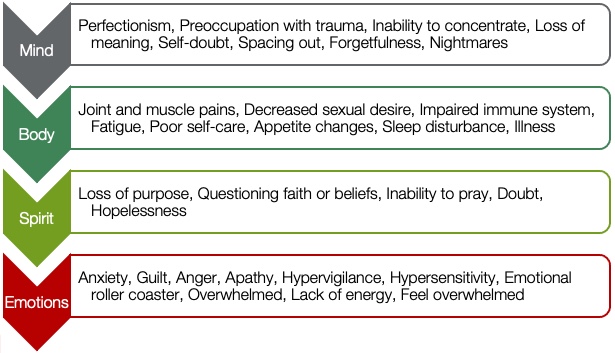Question
What are the signs and symptoms of compassion fatigue?
Answer
Compassion fatigue symptoms will show up in multiple areas of your life including physical, psychological, emotional, spiritual, personal, and professional, as seen in the list below.
- Fatigue or illness
- Cynicism
- Irritability
- Reduced productivity
- Feelings of hopelessness, anger, despair, or sadness
- Anxiety
- Appetite changes
- Feeling overwhelmed
- Feelings of re-experiencing an event
- Sleep disturbances and nightmares
- Avoidance of people or activities
- Persistent anger and sadness
- Poor self-care
It includes things like chronic exhaustion which can be emotional, physical, or both. It also includes things like reduced feelings of sympathy or empathy and feelings of irritability, anger, or anxiety. There are physical symptoms like headaches, trouble sleeping, weight loss, impaired decision-making, problems in personal relationships, and poor work-life balance. Notice as you look at the list above how they cross boundaries of mind, body, spirit, and emotions. Compassion fatigue affects you as a whole person.
This is a good place for us to pause for a few minutes and reflect. I would like for you to write one or more symptoms of compassion fatigue that you have experienced. Figure 2 shows a list of symptoms from Dr. Figley for you to look at as you are writing. Take a moment to review these and reflect on then write down any that you have personally experienced.

Figure 2. Symptoms of compassion fatigue.
If we were doing this training in person, I would ask you to hold up your list forward-facing and walk around the room and read how compassion fatigue is affecting not only you but also your coworkers and your colleagues. Every time that I have done this with a group, I can tell that there are those who probably do not want to share their symptoms. I always take the time to thank them for having the courage to share with others. I want to thank you today for having the courage to reflect on what is currently going on with yourself.
What I hope when I do this exercise after participants walk around a training room and they start to see heads nod, is that they will know that they are not alone, and you are not alone either. You are not alone. I ask you to do this reflection because the prevention of compassion fatigue starts with awareness. We must understand that we are at risk to get to the scope of this issue.
